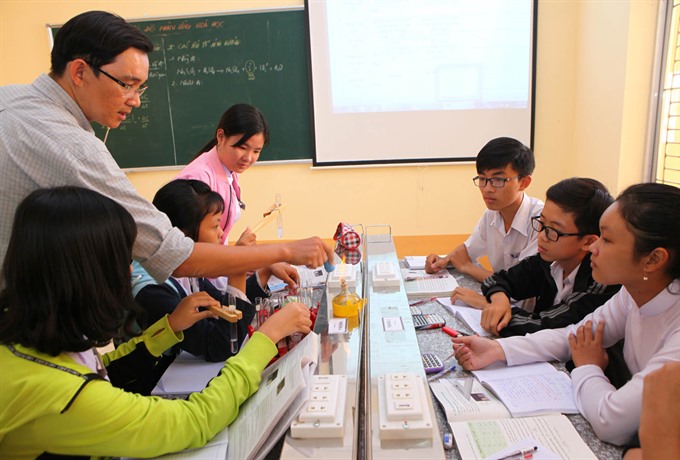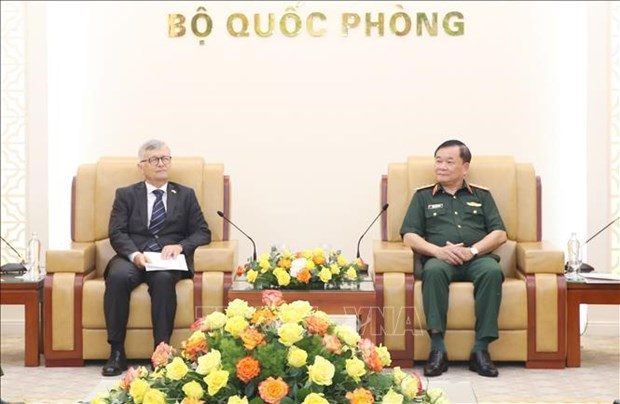 Society
Society

The alarming number of teacher attacks issues an urgent demand on both administrative and financial solutions from policymakers.
 |
| Huge pressure, low wages and indignity have driven many teachers to leave the profession. VNA/VNS Photo Quý Trung |
HÀ NỘI – Teachers are increasingly under attack across Viet Nam, requiring administrative and financial solutions from policymakers.
On February 28, at Bình Chánh Primary School in the Mekong Delta province of Long An, the parents of four students demanded a teacher kneel down in retaliation for imposing a similar punishment on the whole class.
The incident deeply shocked a nation where teaching has been long considered a prestigious and respected profession.
Education minister Phùng Xuân Nhạ asked the provincial People’s Committee to take action to protect the teacher’s dignity. They responded by expelling of the four parents from the Party.
Days later on March 2, at Bến Tre Province’s Tân Thạch Secondary, an eighth grade student strangled his teacher in front of the whole class for asking his friend not to do help him do his work and seizing her notebook.
Last year witnessed several assaults on teachers, causing serious mental and physical damage.
Trần Văn Phú, principal of Đỉnh Sơn Primary School in the Central Province of Nghệ An, in October, had his face cut as he tried to stop a fight among students’ parents.
In September, Phạm Thị H, a young teacher at Hải Phòng City’s Đặng Cương Primary School was ferociously attacked by a group of parents for beating a student for not wearing a uniform. She is still recovering at Việt Tiệp Hospital.
To deal with the threat of being attacked by students and parents, TTH, a teacher who wished to remain anonymous in Nghệ An Province, told Nông thôn ngày nay (Countryside Today) newspaper that she had set a list of principles to ensure safety, including not beating students.
Trần Thị Quỳnh Trang, a former teacher who quit after slapping a student, said that teachers needed to remember not to beat students or use low scores as punishments.
“Teachers will remain aloof by applying those principles, aiming to protect themselves,” she said.
Huge pressure, low wages and indignity have driven many teachers to leave the profession.
Nguyễn Thị Thành, a teacher of Mường Lát High School in Thanh Hoá Province, resigned after seven years working in the mountainous area. With a salary of only VNĐ5 million (US$219) a month, she found it hard to make ends meet.
“I have to do different jobs to earn money, including making traditional medicine. As I see potential to develop the craft, I quit to focus on it,” she said.
In the northern province of Lào Cai, 26 teachers withdrew from the payroll, according to Trần Quang Vượng, a representative of the provincial Department of Education and Training.
“Policies towards teachers need to change, especially a salary increase to prevent them from quitting,” he said.
However, the reform process is demanding.
Nguyễn Thị Huyền Thảo from Trần Đại Nghĩa High School for the Gifted in HCM City, stressed a democratic working environment as a prerequisite for the development of every teacher.
“Democracy, respect and opportunities are the most important things to any teacher. If those requirements are fulfilled, excellent teachers will wholeheartedly contribute to education despite their low wages, I think,” she said.
More troubling for the sector, after 20 years the policy of tuition-free pedagogy education could be scrapped. Due to the demand of labour market, a huge number of pedagogy graduates cannot find work in education or are unemployed entirely, creating a waste for the State budget.
“Therefore, pedagogy students will need to pay tuition fees. However, to attract and create favourable conditions for them, the draft Law of Pedagogy says that if they work in the educational sector for a certain period of time, they will not need to pay back their loans. The draft also regulates pedagogical credits and reimbursement policies for students of pedagogy universities,” said Nhạ.
Meanwhile, Phan Thanh Bình, Chairman of the National Assembly Committee on Culture, Education, Youth and Children stressed the significance of a reform of training facilities and human resources.
“The admission process and curriculum needs to be adjusted to attract excellent students to enroll in pedagogy schools and preserve teachers’ dignity,” he said. — VNS









